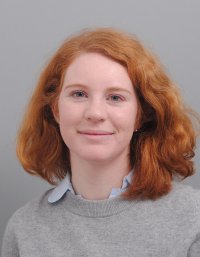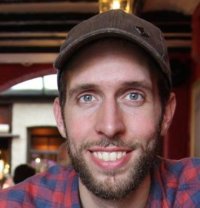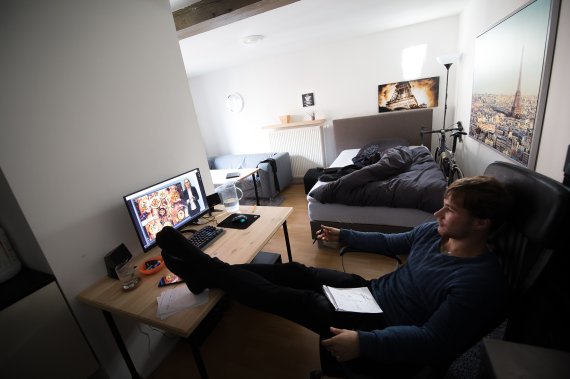photo Sven Menschel
The first Wageningen MOOC (massive open online course) for credits is the module ‘Food security and sustainability: Systems thinking and environmental sustainability’. Just like the other online courses at WUR and other universities, this course can be found on the education platform edX, where anyone can take MOOCs.
It is even possible in some cases to get credits for Wageningen MOOCs, but then you do need to be registered at Wageningen University. Then you get access to a closed platform that is exclusively for Wageningen students. This kind of MOOC which comes with credits is called a SPOC (small private online course)and sometimes includes additional assignments to make it more challenging.
Green screen
Lecturer Eddie Bokkers of the Animal Production Systems chair group helped develop the MOOC/SPOC on Food Security. He had to stand in front of a green screen in a studio and read from a script. ‘It’s not like giving a lecture.’ Although he enjoyed the experience, there was something missing for Bokkers. ‘On this course I had no idea who the students were. You don’t see them or talk to them, whereas that is exactly what makes teaching so interesting.’
‘The defining characteristic of a MOOC is indeed that there is no direct interaction with the teacher,’ says Ulrike Wild, online and open education programme director at WUR. WUR researcher Gwenda Frederiks is currently researching what students really think of this. ‘Some of the students didn’t like the lack of contact with the teachers, but the majority felt no need for that at all,’ she says.
There is an online discussion forum for students taking a SPOC. Some of the students moderate the forum, and they pass on tricky or frequently asked questions to the teacher. The forum is not used very much, says Frederiks. Student Josanne Dalstra: ‘It’s good there’s a forum but everything was clear to me actually.’
Flexible
A much-vaunted advantage of online education is flexibility. Wild: ‘It can be a tremendous advantage that it is not scheduled. That way you can say: ‘I’ll reserve one week in July and do the course then. Or you can work on it every night.’ Students Iris, Josanne and Evert confirm that it suited them very well to be able to adapt their studying schedule to their own situation (see boxes).
Wild sees a second big advantage to online education: it enables students to take courses at other top universities which are not offered by Wageningen University. And it is not just for ‘regular’ students that it provides a chance to take online courses at universities such as Harvard or MIT. Wild: ‘Online education is a chance for working people after leaving university, for people who cannot get to a campus, or for people who are not in a position to study fulltime for other reasons.’
However, there are no watertight system yet for delivering online exams for the MOOCs and SPOCs, so for the time being the exams have to be taken at the campus of the university providing the course.
Tinder
Online education is generally seen by Wild, Bokkers, Frederiks and the students as a flexible addition to the university’s programme, rather than as a fixed component of it. Bokkers: ‘A MOOC is interesting for our chair group and for the university: it enables us to make our presence felt. But I wouldn’t like to see all the teaching delivered like this. That would be too limited a form of education, both for students and for teachers.’ Student Iris Mathar: ‘As something to do on the side, I was quite happy with an online course. But in period 3, for example, when you only take one course, I would much rather just go to the uni, take a class, be able to ask questions and sit side by side with others in a classroom.’
Eighteen of the 66 students registered for the SPOC ‘Food Security and Sustainability: Systems thinking and environmental sustainability’ have taken exams too. Wild was positively surprised by this figure. But in general not many students manage to find their way to the MOOCs. Wild feels students could be more pro-active. ‘You register with Spotify and Tinder too, and it’s not that much harder to register on the online education platform edX.’
Students can find more information about MOOCs with credits at http://www.wur.nl/en/Education-Programmes/Online-Education/MOOC/Credits-for-MOOCs.htm.
‘It is lonely but efficient’

Iris Mathar, Bachelor’s student of Nutrition and Health
‘In that period I took two courses for which I had to write an article in a group, but I didn’t feel like doing nothing but writing all day. And I thought doing an online course as well would be a nice challenge. The advantage was that I could do a bit of work on it any time I got the chance, in between appointments. Normally you have to cycle to lectures and you don’t get a break in between. Now I just sat down at my laptop and got started. It is much more efficient. You can also speed up the films, which is really cool. But I wouldn’t want the whole programme taught online. It is a very individual way of working, of course. It’s quite lonely.’
‘I had just one credit still to get’

Josanne Dalstra, Master’s student of Plant
Sciences‘I took one online course alongside my thesis, because I still had to get one credit. I wasn’t expecting such a high standard, but it was a normal three-credit course. And I liked that about it. You can easily cover the different modules week by week. At some point it got harder because I was working on my thesis a lot. But it only needed a couple of hours, which you can fit in during the evening. It is flexible. I think a course like this is useful, for example for people who haven’t got anything to do for a month or so after finishing an internship. But it is a pity you can’t do the exam straightaway. That is a downside.
‘I wanted to spend more time with my family’

Evert Prins, Master’s student of Organic
Agriculture‘I live in Brabant. I go up and down by car, driving 90 kilometres a day. We had a baby boy last February so I decided to take things a bit easier for a while and spend more time at home with my family. But I didn’t want to do nothing at all. Then I found this. It was a good course in terms of content and visuals. If I’d been living in Wageningen like most students, my preference would be 100 percent for a real class. But if the subject appealed to me, I would do another online course some time.’

